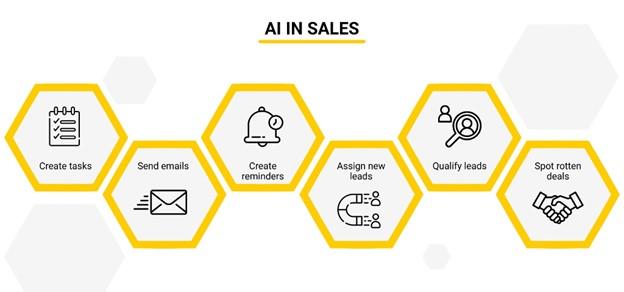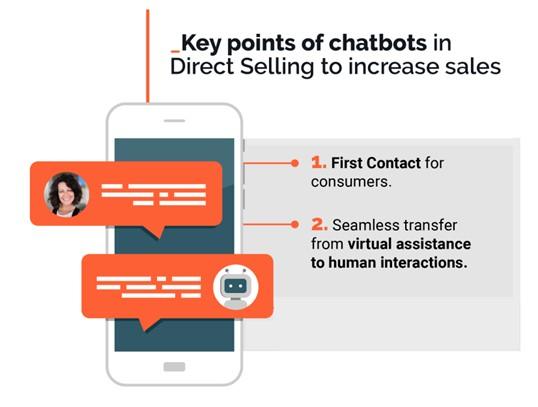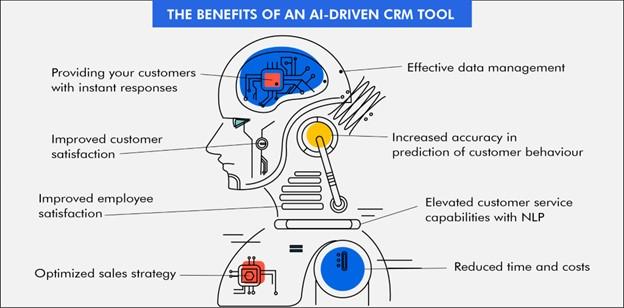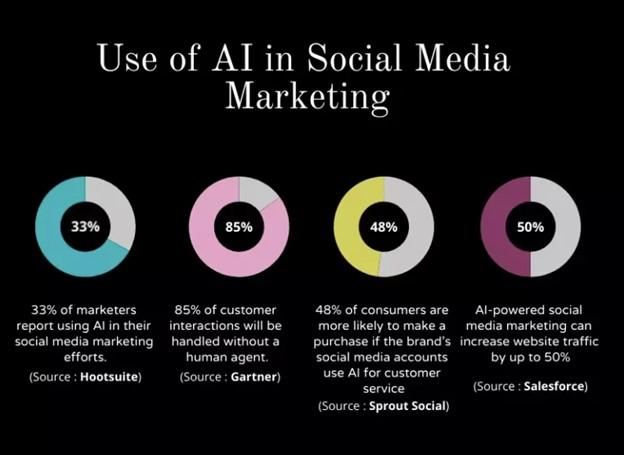Harnessing AI for Sales Success: A New Era of Selling

Did you know? Despite the presence of advanced technology, many sales organizations do not fully utilize them. CRMs, for instance, are often not actively used or are used merely as storage for customer information. In addition, sales reps might be spending excessive time on non-sales activities. On average, only 32% of their time, according to the Sales Mastery 2022 survey, is devoted to actual selling.
AI significantly aids in the sales process. However, adopting it isn’t straightforward. The transformation isn’t just about installing new software but about optimizing its performance to fit the unique requirements of the sales process. This piece intends to delve deeper into how AI is being used in sales and how it can be utilized more effectively. Curious to learn more? Then read on!
The digital evolution of sales: where it all started
Sales, as an industry, has experienced a remarkable metamorphosis over the years, adapting and evolving with each technological breakthrough. In the early days, salespeople relied on face-to-face interactions, cultivating relationships and trust through physical meetings and handshakes. Then came the era of emails and the dot-com boom, opening the door to a broader reach.
Fast-forward to today, and we are amidst yet another revolution. The age of digital connectivity has brought forth tools like CRMs, automated marketing platforms, and data analytics, enabling a deeper understanding of customer behaviors, preferences, and pain points. But the crown jewel in this ever-evolving landscape is Artificial Intelligence. As we continue to uncover its vast potential, AI stands poised to redefine sales, pushing boundaries and setting new paradigms. It is no longer about just selling a product or service; it’s about delivering tailored experiences, predicting needs, and fostering deeper connections.
 Laying the groundwork: AI in your sales strategy
Laying the groundwork: AI in your sales strategy
Harnessing the power of AI in sales isn’t just about plugging in a tool and hoping for magic. It’s built upon three fundamental pillars. First and foremost is the infrastructure. AI requires a robust technological foundation to be brought to fruition. This means seamless integration with existing systems, cloud capabilities for scalability, and a focus on security to protect invaluable data.
Speaking of data, it’s the second pillar. AI is only as effective as the data it’s trained on. Accumulating vast amounts of data is one thing, but ensuring its quality, relevance, and consistency is what truly matters. Clean, structured data not only trains AI models efficiently but also ensures that the insights derived are actionable and accurate.
Lastly, while machines and data are crucial, the human element can’t be ignored. Investing in human capital is paramount. It’s the people who will interpret AI’s insights, apply them strategically, and build relationships with clients. Therefore, continuous training and ensuring that the team understands the potential and limitations of AI is vital.
AI tools to supercharge your sales department
The fusion of artificial intelligence (AI) with sales has heralded a new era in how businesses connect with their customers, refine their strategies, and boost their revenues. Let’s now dig into some of these transformative tools.
AI chat interfaces and virtual sales aides
Artificial intelligence-driven chat interfaces interact with online visitors in real time. They address questions, navigate customers through product selections, and can even seal deals. Tailoring suggestions based on the behavior and inclinations of the user, these AI tools can also promote additional products or related items. For instance, Sephora’s virtual assistant stands out by guiding shoppers in product selection, curating product suggestions based on individual requirements, and addressing common queries.
 Pros:
Pros:
- Consistent round-the-clock customer interaction without human involvement;
- Immediate feedback, enhancing the user experience;
- Efficiently manages redundant questions, freeing human representatives for intricate concerns.
Cons:
- Their limited comprehension can occasionally cause user irritation;
- The absence of a personal touch may not gel well with every sales scenario.
AI-enhanced relationship management systems
Artificial intelligence-fortified Customer Relationship Management (CRM) tools offer automation in areas such as data documentation, lead evaluation, and reminders for follow-ups. They furnish insights into client behaviors and tastes. Salesforce’s Einstein, as an illustration, taps into AI to offer sales predictions, ranks leads, and even mechanizes client conversations.

Pros:
- Drastic reduction in time spent due to minimized manual operations;
- Elevated lead assessment efficiency;
- Enhanced grasp of client inclinations, facilitating superior relationship cultivation.
Cons:
- Often necessitates a learning phase and orientation;
- Integration with other tools or infrastructure can sometimes be challenging.
Leveraging AI for in-depth sales analysis
Modern businesses are increasingly turning to AI-driven platforms to glean deeper insights into their client’s priorities, enabling them to offer tailored solutions at an unmatched pace. These solutions delve into extensive data to foresee upcoming sales patterns, client inclinations, and possible attrition. A case in point is IBM’s Watson Analytics, which several enterprises leverage to delve into sales metrics, discern trends, and project upcoming sales.
Another example of such tools that have revolutionized the sales intelligence process is a digital research assistant designed with AI and machine learning at its core. This platform delves into the intricate details of earnings call transcripts to determine the crucial imperatives of both existing and potential clientele.
For instance, Accenture has harnessed the power of its Value Insights Platform (VIP) to dramatically reduce the time spent on this analysis. But like all tools, AI-driven sales intelligence platforms come with their set of pros and cons.
Pros:
- Efficiency: Reduces the time and effort required to analyze earnings call transcripts, allowing businesses to process vast amounts of data swiftly.
- Tailored solutions: By identifying client objectives, these tools can seamlessly match them with the most suitable solutions, ensuring a more personalized sales approach.
- Predictive capabilities: Enables sales teams to forecast future trends, equipping them with a unique, value-based selling strategy.
- Competitive advantage: The speed and depth of insights provided can give companies a significant edge over competitors.
Cons:
- Data reliability: As these platforms rely heavily on the quality of the data fed into them, any inaccuracies in the source material can lead to misleading insights.
- Complexity: Initial setup and integration can be intricate, requiring time and expertise.
- Over-reliance: There’s a risk that sales teams might rely too heavily on the tool, potentially sidelining human judgment and intuition.
However, the true brilliance of such platforms isn’t merely time efficiency. Once they pinpoint specific client objectives, like aiming for significant savings within a set period, these tools can seamlessly match them with the most appropriate solutions. Whether a client’s focus is on revenue optimization, operational improvements, or sustainability efforts, these AI-driven platforms evaluate the client’s performance against industry counterparts, suggest viable solutions, and estimate the potential financial benefits of achieving set targets.
The predictive prowess of these AI tools equips sales teams and technical experts with an unmatched approach rooted in real value. They can promptly provide actionable insights, granting companies a significant competitive edge. As evidence of their effectiveness, platforms like VIP have garnered vast user bases worldwide and have been instrumental in driving impressive sales figures, with Accenture alone attributing over a billion dollars in sales to its capabilities in recent years.
Harnessing AI for advanced forecast management
In today’s fast-paced business world, companies across industries are on the hunt for tools that elevate their sales forecasting accuracy, facilitate informed decision-making, and enable precise predictions for both immediate and long-term performance. Especially for enterprises operating on a global scale with myriad teams and a melange of sales resources, the allure of an automated system consolidating all sales processes onto a single intuitive platform is undeniable. The goal? To gain real-time insights and enhance overall efficiency.
 Take, for example, the global tech giant Honeywell. Recognized for crafting solutions spanning aerospace, performance materials, and safety, Honeywell sought out a platform that would not only unify its disparate sales tools but also offer granularity in analyzing its deal portfolio by various factors like geography, product line, and business model.
Take, for example, the global tech giant Honeywell. Recognized for crafting solutions spanning aerospace, performance materials, and safety, Honeywell sought out a platform that would not only unify its disparate sales tools but also offer granularity in analyzing its deal portfolio by various factors like geography, product line, and business model.
Their choice was Aviso. This platform was tailored to Honeywell’s unique needs, providing in-depth analysis capabilities across various segments, coupled with deal intelligence to scrutinize the sales pipeline. This facilitated understanding the overall health of deals and spotlighting the ones with the potential to drive sales figures beyond quotas.
Key features and benefits:
- Individualized forecasting: Allows sales teams to offer their distinct insights and projections, resulting in a holistic forecast and individualized predictions for their specific components.
- Customized dashboards: Equips each salesperson with a personalized dashboard detailing forecasts, accounts, communications, and more.
- Spotting trends and opportunities: Helps sales managers detect emerging trends, recognize potential deal opportunities, and pinpoint challenges hindering successful sales closures.
- Conversational intelligence: A cutting-edge feature, it captures vital data from calls, online meetings, and emails, offering in-depth insights into the status and potential of forecasted deals.
As a testament to the potency of such tools, businesses like Honeywell have witnessed remarkable outcomes. For them, this meant an impressive rise in estimated revenue, substantial CRM cost savings, significant spikes in pipeline activity and online rep-customer interactions, and a surge in new deal closures.
Leveraging AI for enhanced social selling
In the realm of sales and marketing, staying ahead means staying informed. With the increasing influence of social media on consumer decision-making, it’s imperative for sales professionals to understand and cater to their clients’ ever-evolving interests, both personal and professional.
AI-fueled solutions trawl through social media for brand mentions, pertinent products, or associated terms. They’re adept at sentiment analysis, gauging brand image, and even autonomously interacting with users. A practical example is Brandwatch, which utilizes AI to track mentions across digital platforms, gauging public sentiment, and equipping businesses to engage timely and effectively with their base.
 Another prominent example in this space is the utilization of the Seismic LiveSocial platform by global software entities like SAP. Formerly known as Grapevine6, LiveSocial enables sales professionals to seamlessly integrate their social media profiles. Once linked, the platform paints two distinct portraits for each user: one rooted in their professional aspirations and concerns, and the other reflective of personal pursuits and passions.
Another prominent example in this space is the utilization of the Seismic LiveSocial platform by global software entities like SAP. Formerly known as Grapevine6, LiveSocial enables sales professionals to seamlessly integrate their social media profiles. Once linked, the platform paints two distinct portraits for each user: one rooted in their professional aspirations and concerns, and the other reflective of personal pursuits and passions.
How does It work?
- Dual profiles: These profiles, encompassing elements from professional goals and markets to personal hobbies, provide the AI engine with a foundation.
- AI-driven content discovery: Drawing from these profiles, LiveSocial’s AI delves deep into millions of media pieces daily from an array of sources, pinpointing articles that might align with the salesperson’s interests.
- Content sharing & tracking: Sales personnel vet and, if found apt, share this AI-curated content with their clientele. The platform meticulously monitors these shared posts, gleaning insights into client inclinations.
- Positioning as industry thought-leaders: By sharing timely and relevant content, salespeople can solidify their stance as informed industry experts, a strategy any business can employ to uplift their consultative rapport with clients.
 Real-world outcomes:
Real-world outcomes:
- Integration with other tools: Many sales professionals meld LiveSocial’s capabilities with platforms like LinkedIn Sales Navigator, amplifying their lead engagement and discovery.
- Metrics to marvel: Users of this integrated approach have witnessed surges in deal closing rates and average transaction sizes. Notably, a considerable uptick in their LinkedIn Social Selling Index (SSI) scores – a benchmark for sales efficiency. Those boasting top-tier SSI scores have realized a staggering 55% boost in sales, outperforming peers by closing deals 3.6 times more frequently and securing contracts over 500% larger in value.
- Tangible financial returns: To quantify the impact, firms like SAP have correlated a significant portion of their sales pipeline and closed deals directly to these advanced social selling strategies.
Such AI-fueled social selling avenues aren’t exclusive to industry behemoths. Companies, irrespective of scale or sector, can leverage similar platforms to enhance their customer outreach and engagement, driving tangible bottom-line benefits.
Embracing AI for a competitive edge in sales
An organization’s culture and the collective mindset of its workforce play pivotal roles in ensuring the successful deployment and integration of AI-driven tools. At the epicenter of this transformation should be senior executives, whose support and understanding form the bedrock for wider adoption. Nonetheless, mere executive buy-in is insufficient; the entire organization, from the ground up, must champion these advancements with vigor. Launching such initiatives necessitates a meticulous approach, marked by robust goal-setting, continuous benchmarking, and unwavering accountability.
Those companies that have dived headfirst into the AI-enhanced sales realm are setting a robust benchmark. Their confidence and success underline a critical narrative: hesitation or reluctance to adapt can potentially render businesses obsolete. Our recent survey underscores this sentiment, revealing that organizations that sidestep AI integration in their sales processes risk falling into a detrimental competitive void.
Pioneers like Andersen, Accenture, Honeywell, and SAP exemplify the transformative power of synergizing AI with robust sales strategies and enduring customer relations. Their success stories reiterate a vital lesson for all businesses: irrespective of the depth of your customer relationships or the intricacy of your sales operations, AI propels businesses to unprecedented heights of profitability and relevance in an increasingly digitalized marketplace.
This article is written by Alina Vasylenko, Business Analysis and Sales Management expert at Andersen.




























































